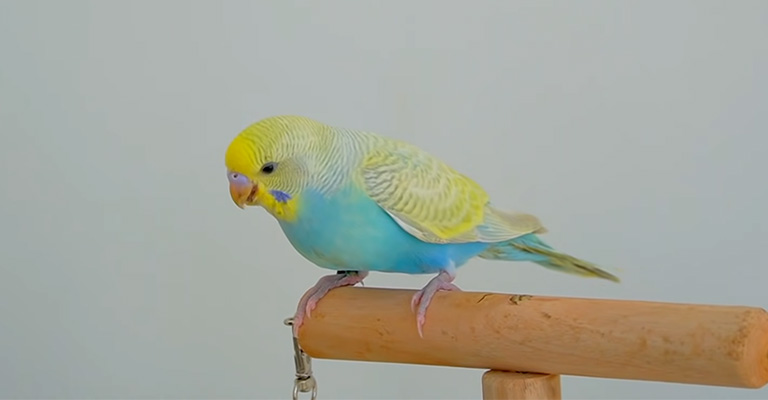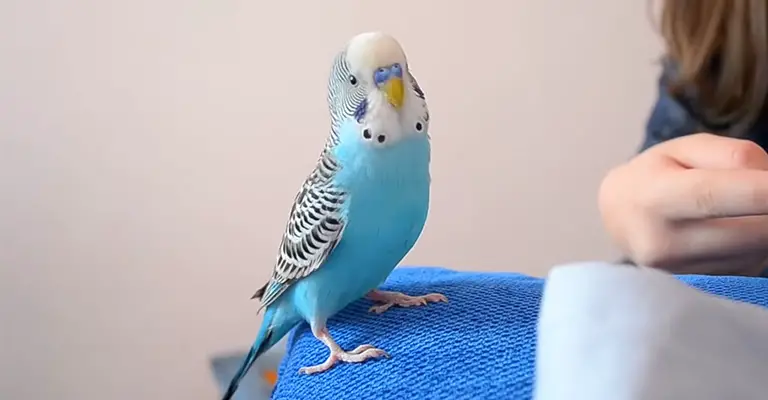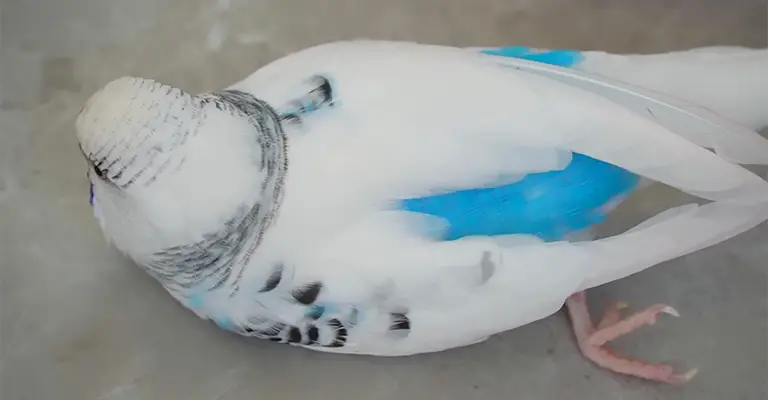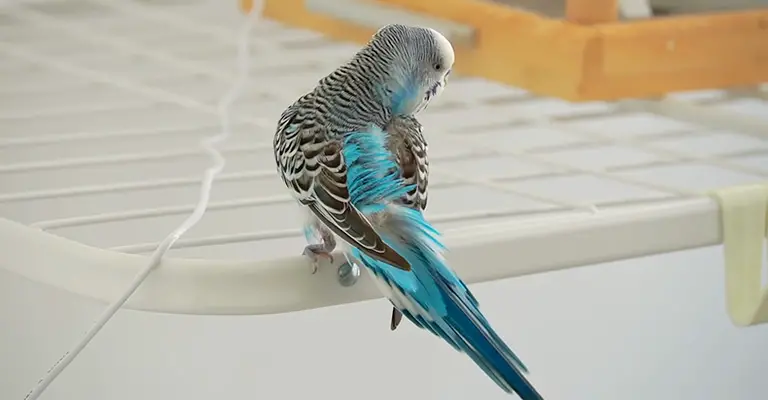The majestic flight of a budgie is a sight to behold, as these vibrant avian companions effortlessly navigate the air with grace and agility. Yet, what do you do when your budgie’s soaring escapades take an unexpected turn, leading to mid-air somersaults and gentle tumbles?
If you’ve found yourself wondering why is my budgie falling while flying, you’re not alone. In this exploration, we delve into the captivating world of budgie flight to demystify the reasons behind those occasional mid-flight mishaps.
From developmental stages to environmental factors, we’ll spread our wings and explore the intriguing insights that shed light on why your budgie might be taking an unplanned detour from its usual aerial elegance.
Join us as we navigate the skies of curiosity to uncover the secrets of why budgies sometimes find themselves in mid-air twists and turns.

Why Is My Budgie Falling While Flying?
If you’ve observed your budgie taking a brief dip while soaring, you’re not alone in your curiosity. Let’s uncover the intriguing reasons behind those momentary mid-air stumbles.
Developmental Learning Curves
Just like a fledgling learning to walk, young budgies navigate a learning curve when it comes to mastering flight. In their early days of exploration, their wings may not be as coordinated as those of their more experienced counterparts.
These youthful attempts at flying might result in momentary dips and tumbles as they fine-tune their aerial prowess.
Coordination and Maneuvering Challenges
While budgies are natural fliers, intricate maneuvers require precise coordination. A sudden change in direction, an abrupt attempt at landing, or even attempting fancy loops can occasionally throw off their balance.
These mid-air hiccups might appear amusing but are often the result of a budgie pushing its aerial boundaries.
Environmental Influences
The skies are not always still; drafts and currents in your living space can influence a budgie’s flight path. An unexpected gust of air or a breeze from an open window might momentarily disrupt their trajectory, leading to those brief dips. Environmental elements play a part in these skyborne somersaults.
Maintenance Mid-Air
Budgies are diligent groomers, even during flight. A sudden itch or the urge to preen mid-flight can lead to momentary balance disruptions. Their focus on maintaining their plumage, while admirable, can sometimes cause these unexpected dips.
Acrobatics and Play
Budgies are playful creatures, and they might engage in aerial acrobatics just for the fun of it. Spiraling, swooping, and even rolling in the air can be their way of enjoying their flying freedom to the fullest. These playful antics sometimes lead to those “Did you see that?” moments.
Health and Well-being

While most mid-air tumbles are harmless and part of budgie behavior, it’s essential to consider health factors. If you notice frequent or severe falls, it could be a sign of a health issue affecting your coordination or balance. In such cases, a vet visit is advisable to rule out any underlying problems.
Illness or Physical Discomfort
While budgies are generally agile and graceful fliers, certain health issues or physical discomfort can lead to unexpected falls during flight. Illnesses affecting their balance, coordination, or muscle strength can cause them to lose control mid-flight.
Any sudden or persistent changes in flight behavior, especially if accompanied by other signs of illness like lethargy or loss of appetite, should be taken seriously and addressed with the help of a veterinarian.
Age and Senility
As budgies age, their physical abilities may naturally decline. Older budgies might experience reduced muscle strength and coordination, making them more prone to mid-air tumbles. Additionally, senility in aging budgies could lead to lapses in judgment during flight, causing unanticipated falls.
Environmental Distractions
The surroundings in your budgie’s environment can influence their flight behavior. The presence of mirrors, reflective surfaces, or even other pets might catch their attention while flying, leading to temporary lapses in focus and subsequent tumbles.
Sudden Surprises
Unpredictable occurrences, such as loud noises or sudden movements, can startle budgies mid-flight. Their reflexive response to such surprises might involve momentary loss of control or balance, resulting in brief falls.
Nesting or Breeding Behavior
During the breeding season, budgies might exhibit specific flight behaviors, including aerial displays and chasing. These behaviors are often accompanied by rapid and unpredictable movements, which can sometimes result in momentary tumbles.
Individual Personality and Quirks
Just like humans, each budgie has its unique personality and quirks. Some budgies might have a more adventurous spirit and be prone to experimenting with daring flight maneuvers, occasionally leading to unexpected falls.
What to Do If My Budgie Keep Falling While Flying?

If your budgie is repeatedly experiencing falls while flying, it’s essential to address the situation to ensure their safety and well-being. Here’s a step-by-step guide on what to do:
Observe Carefully
Pay close attention to your budgie’s flight behavior. Note the frequency and circumstances of the falls, as well as any other accompanying changes in behavior, appetite, or energy levels.
Assess the Environment
Make sure your budgie’s flying environment is safe and free from hazards. Remove any obstacles, mirrors, or distractions that could contribute to falls or startle them mid-flight.
Consult a Veterinarian
If your budgie’s falls are frequent, severe, or accompanied by other signs of illness, it’s crucial to consult an avian veterinarian. Professional advice can help rule out underlying health issues that might be affecting their ability to fly.
Health Checkup
Your veterinarian will conduct a thorough examination to assess your budgie’s overall health. They might perform tests to determine if any medical conditions are contributing to the falls.
Dietary Evaluation
Ensure your budgie is receiving a well-balanced and nutritious diet. Nutritional deficiencies can impact muscle strength and coordination. Your vet might recommend dietary changes or supplements if needed.
Provide Perches
Offer a variety of perches in their cage to encourage exercise and natural foot and leg movements. Different perch sizes and textures can help strengthen their muscles and improve balance.
Consider Cage Size
If your budgie’s cage is too small, it might limit its ability to fly freely and develop strong flight muscles. Providing a spacious cage allows them to practice flying and maintaining balance.
Enrichment and Play
Engage your budgie in mental and physical enrichment activities. Interactive toys, climbing opportunities, and engaging playtime can help improve their coordination and overall fitness.
Monitor Stress
Stress can impact a budgie’s behavior and physical well-being. Ensure they have a peaceful and comfortable living environment. Avoid sudden loud noises or disturbances that might startle them.
Supervise Flight Sessions
While your budgie is recovering or improving their flying skills, supervise their flight sessions to prevent injuries from potential falls.
Be Patient
If there are no underlying health issues, your budgie might simply need time to develop better coordination and flight skills. Be patient and supportive as they learn and grow.
Remember that each budgie is unique, and the reasons behind their falls can vary. Consulting with a veterinarian is essential to pinpoint the cause and determine the best course of action.
With your care and attention, your budgie can overcome any challenges and enjoy safe and confident flights.
Why Has My Budgie Stopped Flying?

If your budgie has suddenly stopped flying, there could be various reasons behind this change in behavior. Here are some potential factors to consider:
Health Issues
One of the primary reasons for a sudden decline in flying activity is a health problem. Illnesses, injuries, or pain can lead to reduced mobility and energy levels. If your budgie is experiencing any health issues, such as respiratory problems, wing injuries, or infections, it may avoid flying due to discomfort.
Stress or Fear
Budgies can be sensitive to changes in their environment. New noises, sudden movements, or the presence of unfamiliar people or pets can cause stress or fear, leading them to avoid flying. Anxious budgies might prefer to stay perched where they feel more secure.
Lack of Exercise
Budgies require regular exercise to maintain their muscle strength and coordination. If their flying space is limited or they don’t have enough opportunities for movement and exploration, they might become less inclined to fly.
Obesity
Obesity in budgies can affect their ability to fly. Excess weight can strain their muscles and joints, making flying difficult and uncomfortable. An unhealthy diet or lack of exercise can contribute to weight gain.
Age
Older budgies may naturally become less active and enthusiastic about flying as they age. Their energy levels and muscle strength might decline over time.
Changes in Habitat
If you’ve recently rearranged their cage or introduced new items, your budgie might need time to adjust.
They could be assessing their new surroundings before feeling comfortable enough to resume flying.
Traumatic Experience
If your budgie experienced a traumatic event related to flying, such as a collision or a fall, it might associate flying with danger and become hesitant to do so.
Molting
During molting periods, budgies might experience discomfort due to the loss and regrowth of feathers. This can impact their flight abilities temporarily, leading them to reduce flying until their new feathers have grown in.
Hormonal Changes
Hormonal fluctuations, particularly during breeding seasons, can affect budgie behavior. Some budgies might become less active or focused on flying as they prioritize other behaviors associated with breeding.
Social Dynamics
Budgies are social birds, and changes in their flock dynamics can impact their behavior. The presence or absence of other budgies might influence their inclination to fly and interact.
Environmental Changes
If the lighting, temperature, or humidity in their environment has changed, it could affect their activity levels. Ensure that their living conditions are comfortable and conducive to physical activity.
Personal Preference
Just like humans, each budgie has its personality and preferences. Some budgies might naturally be less inclined to fly and prefer to spend their time perched or engaging in other activities.
FAQs
Sudden changes in behavior, such as stopping flying, are not entirely uncommon in budgies.
While there can be various reasons behind this change, it’s essential to observe for any accompanying signs of illness, stress, or discomfort.
Creating a safe and stimulating environment is key. Provide ample flying space, engaging toys, and perches of varying sizes.
Gradually reintroduce flight opportunities and ensure a calm atmosphere that minimizes stress.
Yes, molting can impact a budgie’s flight abilities. During this period, they might feel uncomfortable due to feather loss and regrowth. Once their new feathers grow in, they’ll likely regain their flying capabilities.
Yes, obesity can hinder a budgie’s ability to fly. An unhealthy diet and lack of exercise can contribute to weight gain, which in turn affects their muscle strength and agility.
If you suspect a health problem, consult an avian veterinarian. Professional evaluation and necessary tests can help identify any underlying issues and guide appropriate treatment, if needed. It’s important to address health concerns promptly to ensure your budgie’s well-being.
Conclusion
While the flight of a budgie is often synonymous with grace and precision, the occasional mid-air tumble reminds us that even avian acrobats have their moments of unpredictability.
As we’ve journeyed through the possible reasons behind these airborne escapades, it becomes clear that there’s a mix of factors at play.
From the developmental stages that shape a budgie’s flight skills to the environmental variables that influence their mid-air maneuvers, the complexities of flight are a dance between nature and nurture.
Young budgies learning the art of flight and mastering their coordination may experience more wobbles.
Ultimately, it’s a testament to the individuality of each budgie, their growth journey, and the dynamic interplay between their innate instincts and the world around them.
As bird enthusiasts, we cherish these moments not just for their amusement, but also for the glimpse they offer into the lives of our avian companions.